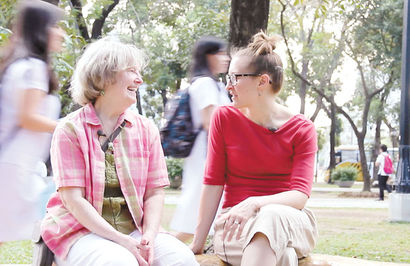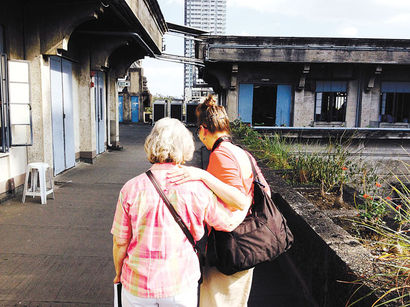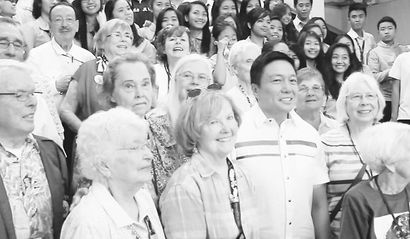
Ellis revisits her family’s life in an internment camp in the Manila
 Heather Ellis, mission chair at Vincent United Methodist Church in Minot, North Dakota, was an infant when she and her family were held prisoners of war in a Japanese internment camp in the Philippines during World War II. Ellis was born in the Philippines where her father Bishop Don Holter served the Central Church in Manila.
Heather Ellis, mission chair at Vincent United Methodist Church in Minot, North Dakota, was an infant when she and her family were held prisoners of war in a Japanese internment camp in the Philippines during World War II. Ellis was born in the Philippines where her father Bishop Don Holter served the Central Church in Manila.
Photo: Heather Ellis and her daugher, Holly Ellis Spiegel visit while in Manila in February 2015. Photo courtesy of Heather Ellis.
Heather, a member of Minot Vincent United Methodist Church in Minot, North Dakota, returned to the Philippines in February accompanied by her daughter and son-in-law, Holly and Brendan Ellis Spiegel, of Brooklyn, New York to attend a 70th anniversary liberation reunion of ex-POWs who were in the Santo Tomas Internment Camp. Children of the internees also attended.
Rev. Don Holter and his wife Isabelle served the Central Church in Manila from 1934 to 1940. Heather, and her sisters, Phyllis and Martha were born in the Philippines.
In 1934 he began a tour as Philippian at Central Church in Manila, where a riff had occurred in the church. Rev. Holter worked to build it back up, to be the dominant church. The church became known as Central Student Church.
Holter returned to the United States in 1940, to Drew University, on sabbatical for one year. Then he was elected as president of Union Theological Seminary.
In January of 1942, while Holter was serving at Union Theological Seminary, the Japanese occupied Manila and sent a notice that all religious leaders must attend a meeting. The Japanese wanted all of the missionaries and pastoral leaders to sign a five-point pledge.
But Rev. Holter and some of the other religious leaders refused to sign the pledge. One the five points of the pledge referred to the Japanese leadership in Manila as “A Will of God.”
“They kept calling my dad and the others back. Trying to convince them that ‘they did not understand’, and that it did not really mean anything. My Dad and others thought if it didn’t mean anything than there was no reason to sign the document,” said Heather Ellis.
 Then on a Sunday morning in late January, the Japanese came to their home and told her father to pack up enough clothes and food for three days. They took him and the other three religious leaders who refused to sign the pledge to Santo Tomas, an internment camp in Manila, Heather said. She said religious leaders who signed the pledge were told they "could just go back and about their business."
Then on a Sunday morning in late January, the Japanese came to their home and told her father to pack up enough clothes and food for three days. They took him and the other three religious leaders who refused to sign the pledge to Santo Tomas, an internment camp in Manila, Heather said. She said religious leaders who signed the pledge were told they "could just go back and about their business."
Photo: Heather Ellis and her daugher Holly Ellis Spiegel walk through what remains of the Santa Tomas internment camp in Manila. Photo courtesy of Heather Ellis.
"My mother and two sisters were under occupation or house arrest until about the last year. Then my dad was afraid we would be sent to another internment camp so he petitioned to have us come in to Santo Tomas. Luckily they agreed to do that," Heather said.
The camp was located at an old university. At one time during World War II, around 4,000 allied civilian prisoners of war, including U.S., British and Australians, were held at Santo Tomas by the Japanese military.
Heather's father first lived in a gym with many, many cots on the first floor and later moved to the third floor at the camp, Heather said. Heather's mother and her sisters lived in Manila in the Deaconess Training School with missionary wives and other children.
"I was born in the hospital in Manila in 1942 but my mother had to call and have the doctor pick her up and take her to the hospital," Heather said. Her dad was in the camp when she was born.
Heather's father spent 37 months in the camp. "My mother, sisters and I were there for about 15 months until we were liberated Feb. 3, 1945," she said.
Many Americans were in the camp. "Americans are very good about setting up committees so they had committee to run everything. They set up a school and were able to go to school," she said. She said school continued until about December 1944 and then no longer held because of air raids and weakness of the children." Food was very limited and many were living on 800 calories a day," she said.
Heather's father was on the executive committee at the camp. During the last year he was head of the Education Department and taught a history class as well as gave lectures and other talks at adult education classes.
Heather doesn't remember the time spent in the Philippines. "I wish as long as I went through it I did," she said.
In 1945 the POW’s were liberated. Heather and her family returned to Kansas.
Remembering and honoring her father
 Heather has returned to Manila for this reunion and others. “ My daughter has taken an interest in the history of the internment camp at Santo Tomas. She and her husband travelled with me on my recent visit. There is so much we keep learning.”
Heather has returned to Manila for this reunion and others. “ My daughter has taken an interest in the history of the internment camp at Santo Tomas. She and her husband travelled with me on my recent visit. There is so much we keep learning.”
Photo: Heather Ellis stands among others who attended the 70th reunion of the Santa Santo Tomas, an internment camp in Manila,in February 2015. Photo courtesy of Heather Ellis.
Rev. Holter wrote letters to family and also for students at Union Theological Seminary. The letters to his family describe the day-to-day struggles and his unending faith and passion for social justice. He was an excellent role model for the students.
“Another very important reason that my dad refused to sign the pledge - how could he ever ask or face either his students or parishioners to stand up for their convictions if, when faced with a major challenge, he did not. That is the reason that one of the Japanese interrogators told him that if he was ever faced with the same dilemma he hoped he would have the courage to do what my dad did," said Heather.
Rev. Holter wrote a letter for each student that attended the seminary. The letters described the educational process, courses and progress that each student had made. Students were able to carry the letters with them to help document their education as they moved on.
Letters to students and family have been recorded in a document entitled “Under Protective Custody.” Click here to read the document.
Heather can only express pride and gratitude for the work of her father and mother. “As I re-read "Under Protective Custody,” I was very impressed and am proud again of what my Dad did. He was only 33 when he was chairman of the Religious and Indignation Rally protesting the Nazi actions against the Jews, and only 37 when standing up to the Japanese interrogator!" He became President of Union Theological Seminary prior to internment.
About Bishop Don Holter
Don graduated from Baker University in 1927 (A.B.). He then attended Harvard University and Garrett Theological Seminary, earning his Bachelor of Divinity from Garrett in 1930. Don went on to earn his Ph.D. in Church History at the University of Chicago in 1934. Bishop Holter received honorary doctorates from Baker University, Westmar College, Dakota Wesleyan University, and St. Paul School of Theology.
Don was ordained Deacon by Bishop Ernest Lynn Waldorf and Elder by Bishop Charles L. Mead, in the Kansas Annual Conference of the M.E. Church. His first pastoral appointment was as Assistant Minister at the Euclid Avenue Church in Oak Park, Illinois beginning in 193,1 while he was still a seminarian. From 1935 until 1940, Dr. Holter was Minister at the Central Methodist Church in Manila and Professor at Union Theological Seminary there. From 1940 until 1945, he was President of the seminary.
In 1938, Dr. Holter served as Chairman of the Philippines delegation to the International Mission Conference in Madras, India, a delegation which included Dr. Frank Laubach. For three years the Holter family was interred by the Japanese during World War II. They returned to the U.S. in May, 1945. Dr. Holter spent the next year itinerating for the Methodist Missions Board. During 1946–49 he was the Pastor of Hamline Methodist Church in St. Paul, Minnesota.
In 1949 Dr. Holter joined the faculty of Garrett Theological Seminary as Professor of Church History and Missions. In 1958 he spent four months on a special study mission to Africa, including several days spent with Dr. Albert Schweitzer at Lambaréné. On January 1, 1959, Dr. Holter became the founding President of Saint Paul School of Theology, a position he held until his election to the Episcopacy.
Dr. Holter was elected a delegate to U.M. General Conferences (1964–72), serving in 1968 and 1970 as the Chairman of the Legislative Committee on Ministry. He also held positions of leadership in his Annual Conference as well as on General Church Agencies.
Bishop Holter was elected by the South Central Jurisdictional Conference of the U.M. Church in 1972. He was assigned to the Nebraska Episcopal Area, serving one quadrennium before retiring in 1976.